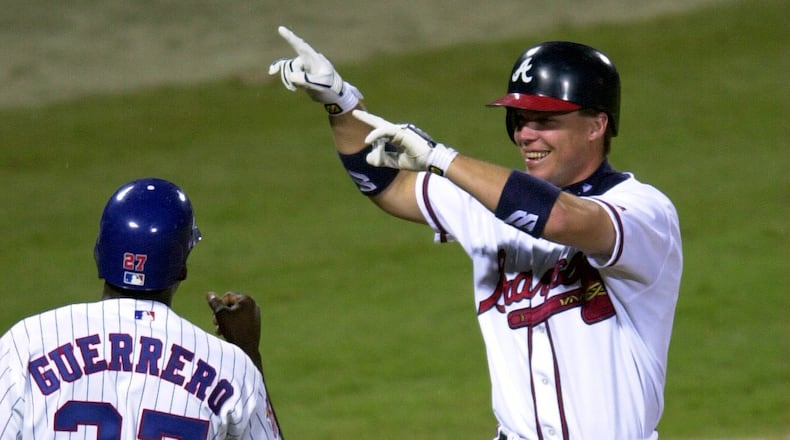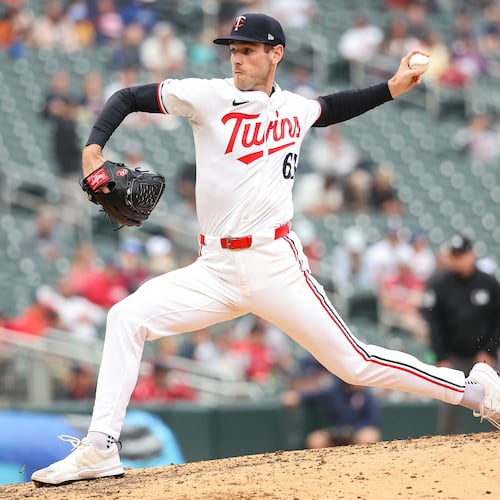Chipper Jones became one of Atlanta’s most iconic athletes during a 19-year major league career spent entirely with the Braves, carving out a spot among the greatest all-around third basemen and most productive switch-hitters in baseball history.
When the National Baseball Hall of Fame announces its 2018 class Jan. 24, Jones, an eight-time All-Star and 1999 National League MVP, will not only be elected on the first ballot, but could finish with one of the highest voting percentages of all time. He was named on 98.5 percent of the ballots made public through Wednesday according to ballot-tracking expect Ryan Thibodaux, with just under half of the expected overall ballots having been divulged.
Seventy-five percent is the threshold for election to the Hall of Fame, and Jones is expected to be joined in the class by Vladimir Guerrero (94.9 percent through Wednesday), Jim Thome (93.3) and possibly Edgar Martinez (81.0), Trevor Hoffman (77.9) and Mike Mussina (72.8).
During a wide-ranging interview, Jones discussed his career, what he’s been up to in the five years since he retired, the robust Hall of Fame support he’s received, which young players remind him of himself, and the state of the Braves, including elite outfield prospect Ronald Acuna.
Jones will be the sixth Brave from the era of success that began in the 1990s inducted in the Hall of Fame when he goes in July 29 at Cooperstown, N.Y., joining former teammates John Smoltz, Tom Glavine and Greg Maddux; their former manager, Bobby Cox, and longtime former general manager John Schuerholz.
This is the final part of a three-part interview in the AJC and on myAJC.com. The first part ran Tuesday and the second part on Wednesday.
Q. I think you changed a lot as you got older and became more of a veteran leader. But when you were a young player, you were that cocky guy that other teams hated, or hated to face, though they all respected. Is there anyone today – I think Bryce Harper comes to mind, though maybe he goes too far with it, but does he remind you at all of your younger self? Or does some other younger player today remind you of yourself?
A. I don't think there's any doubt that there's probably some comparison (to Harper). I think you hit it on the head, maybe he takes it to an extreme from time to time. But he's going to settle in and settle down, along the same lines that I did. It was easy for me to be humble because I played with so many other great players and they had no problem knocking me down a peg or getting my head out of the clouds. Bobby (Cox) was the same way; I can't tell you how many times I got called to the principal's office when I was a young kid. So all those things kind of squelched that. But it rounded me into a better teammate, a better player, a better leader. More of a leader by example. I would think maybe a (Manny) Machado. People say a lot of the same things about him and he does it a little quieter than Bryce, with at least a little less fanfare. I'm not comparing myself to those guys at that age because at that age they were so much better. Or they are so much better than I was. And the sky's the limit for all those guys.
I think if I was to point to one guy that I would want my kids to emulate and to be like that I believe is going to be the face of baseball for the next 10 or 15 years it would be (Mike) Trout. And this guy, I mean…you can tell he’s got my philosophy: I’m going to go out there every day and be one-ninth of the equation that helps us win ballgames. He gets his five at-bats and his three or four chances in the field, so you’re talking about eight or nine chances during the course of the game that directly affect that game, and if you play your position flawlessly and you put up five good at-bats, then you’ve done your job, you’ve been one-ninth of the equation. He’s not looking for the fanfare. He’s not walking guys off. He acts like he’s done it before, and when he does it, he acts like he was supposed to do it. And that’s why I think he garners the respect that he does throughout the game.
Q. Do you get up to New York anymore?
A. The last time I went to New York was for the book signing. Kind of went through the "car wash" up there at ESPN, did some New York press and morning shows and whatnot, kind of promoting the book. But that's been it.
Q. Do you miss that relationship with that city, with New Yorkers? It seemed pretty special as it evolved during your career, especially at the end.
A. It was. I do miss it. When I did go back, it was kind of the same old thing, everybody just kind of fell into the same role – I'd get in the cab and people chase me down the street, or I'd try to do a little window-shopping and I can't, I'd still get the "Chippuh!" with the H on the end, and obviously the "Larry" catcalls.
Yeah, I miss it. I can honestly say the last few years of my career it was a fun relationship. I used to dread going to New York when I was younger because it was more of a hate-hate relationship. But the last five or six years it became more of a love-hate relationship, I think. Both sides had some fun with it.
Q. I know you've long had a good relationship with Derek Jeter. You're doing so much other stuff away from baseball since you retired, and he's thrown himself squarely into this (as new Marlins president). Man, you must be looking at that situation and thinking, I would not want to be involved in that end of it, huh?
A. (Jones laughs quietly at question before answering). You have to ask yourself why you're getting back into it. Is it for money? Which I can hardly believe it would be, knowing Jete. Is it to have your name out there, to be seen? Once you get into ownership and general managing and coaching, every little move is going to be put under a microscope. Every little move is going to be scrutinized. I just don't know if I would want to subject myself to that. I always say that I think the most perfect job in baseball is the assistant general manager because you're not the guy that's out front talking to people. You still have a voice and you still provide input, but it's more behind the scenes.
The guy out front is the guy with the title, and quite frankly I wouldn’t want to have every move that I do scrutinized like that. Because I feel like I’ve got the pedigree that I kind of know what I’m doing. Yes, everything is not going to work out, but it doesn’t mean we’re not trying to do the best we can for our respective organizations. And at some point I think some reporter would ask me the wrong question on the wrong day (Jones laughs), and I would probably say something that I would regret. And I’m just not going to subject myself to that anymore.
Q. It's been a rough winter for the Braves, but do you like what you've heard so far from Alex (Anthopoulos, new Braves general manager)? He seems like he's got them back on a good course, like he has the right personality and approach for someone in that job after what they went through. (Former general manager John Coppolella was forced to resign and was later banned by Major League Baseball for life for several infractions in the international free-agent market. MLB also stripped the Braves of 13 prospects who signed as international free agents.)
A. Yeah, I think he was the right person to bring in after the Braves kind of suffered a black eye, so to speak, around the game. We're so proud of this organization, and this organization is a proud one, and for something like this to happen to us, I think was shocking to everybody. And it's imperative that we bring somebody in who was going to be a positive influence from the top down and is going to run this organization the way we all deem it's supposed to be run.
Just from the few conversations I’ve had with him, he seems like he has a good head on his shoulders, and of course, he knows that he’s got a good farm system – which is a great start; most people don’t have that when they start. He’s going to have some flexibility here in the next couple of years. Now it’s just a matter of getting to know everybody and all these reports and seeing who is going to be an integral part of our organization going forward, who might not be, and then making the necessary moves. All indications are that he’s headed in the right direction, and I can’t wait to get to spring training and see how this is all going to bear fruit here pretty soon.
Q. You think the future still looks bright for the Braves in the near future?
A. I think so. Obviously some of these highly touted prospects are going to have to come up and get their feet wet and get their sea legs under them. I'm extremely excited about Acuna, I think this kid's going to be the next Trout, the next Harper here in the next three or four years. I put up some pretty lofty expectations on him, I think this kid's going to be a top-five player in the game within two or three years. He's got that kind of ability, he's got that I-make-the-game-look-easy kind of Andruw Jones feel in the outfield, and he can flat-out rake. He'll hit the ball out of the ballpark to all fields, I expect him to hit .300, I expect him to steal some bases, and I expect him to play Gold Glove defense. And I expect him to hit in the middle of the lineup. When you do all those things, you're talking about a five-tool, perennial All-Star, MVP candidate.
Q. Watching him play in the Arizona Fall League, he stood out even on a field full of top prospects.
A. Yeah, see, that's the thing that gets you. When I first saw Andruw, he was 16, 17 years old and he was playing against 19- and 20-year-olds, and I didn't even have to see a ball being hit. He was the ballplayer standing out there. And this guy (Acuna) is the same way. Once you see him move and once you see his bat speed and see his feel for hitting at such a young age – because he hits the ball to all fields, with power – it's pretty impressive. So the Braves got a good one. Make sure he's ready when the time comes, and he should take off.
About the Author
Keep Reading
The Latest
Featured


